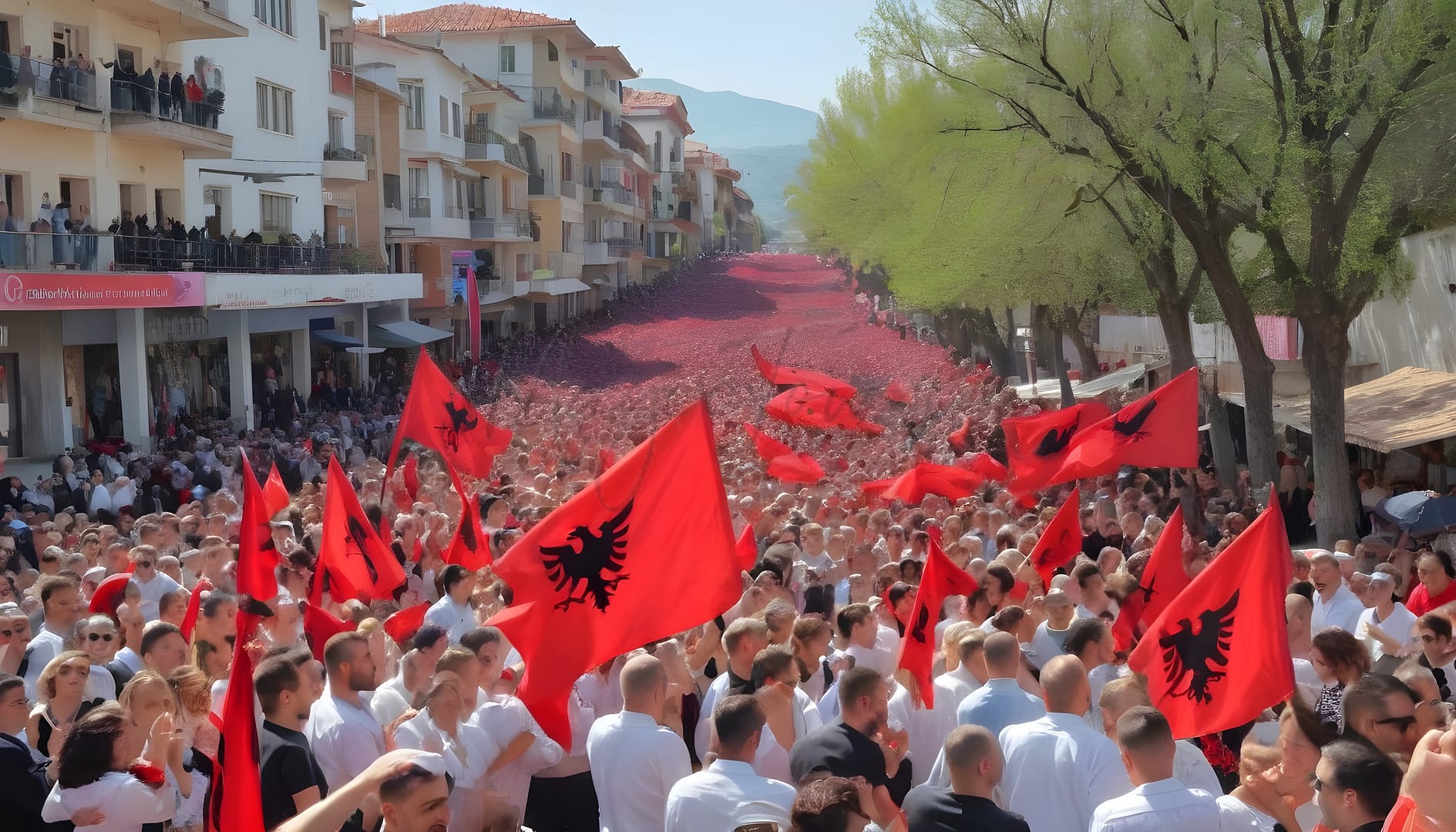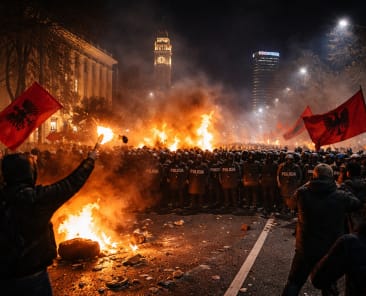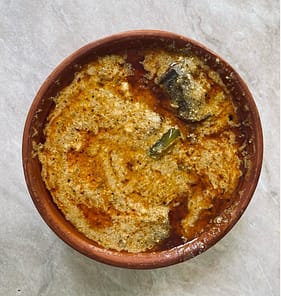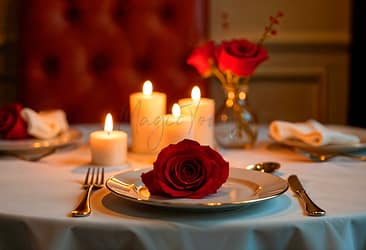Apart from the international holidays, Albanians celebrate some unique holidays you probably haven’t heard about before, and I am sure you’ll find them very interesting. More than a day off marked on the calendar, these dates are seen as moments of rest, reflection, and a chance to spend time with loved ones.
Let’s take a closer look at how Albanians usually celebrate and what holidays are different in this country.
New Year’s Day (31 December, January 1st and 2nd)
Albanians really go all out when it comes to celebrating New Year’s. They make all sorts of tasty dishes, come together with their families, and have a great time together. It’s pretty normal for Albanian families to celebrate by dancing to traditional songs and watching popular TV shows that are part of the New Year’s programs.
Fun Fact: In certain areas of Albania, some families preserve their tradition of visiting their relatives on the 1st and 2nd of January. It’s a special time for them to connect, catch up, and start the new year together.
Summer Day (March 14th)
As winter gives way to spring, Albanians get ready to celebrate the arrival of Summer Day. This holiday marks the transition to warmer weather and the promise of longer days ahead. Families often celebrate by picnicking outdoors, enjoying ballokume (a traditional cookie you can find everywhere during the time of this holiday) and soaking up the sun’s rays in parks across the country. Another interesting thing is the white and red bracelets made out of threads that a lot of people like to wear. (Originally, a Greek tradition, now practised all over the Balkans.) According to the story, the thread should be removed and tied to a flowering tree, to invite birds to come and nest there.
Nevruz Day (March 22nd)
Nevruz Day, also known as Sultan Nevruz in Albania, is a cherished national holiday with roots dating back to the 14th century when Bektashism, a Sufi order of Islam, first spread in the country. Since its official recognition in 1996, Nevruz has become a symbol of cultural heritage and national unity, celebrated by Albanians of various religious affiliations. The famous dessert called Ashure is prepared and enjoyed during this time.
Catholic Easter (March 31st)
For Albania’s Catholic population, Easter is a time of spiritual reflection and rejoicing in the resurrection of Jesus Christ. Families attend church services, exchange greetings of “Happy Easter,” and gather for festive meals featuring traditional dishes such as roasted lamb and dyed eggs. It’s a joyous occasion that brings people closer to their faith and each other.
Eid al-Fitr (End of Ramadan) (April 10th)
Marking the end of the holy month of Ramadan, Eid al-Fitr is a time of gratitude, charity, and celebration for Albania’s Muslim community. Families come together to share special meals, exchange gifts, and offer prayers. It’s a time to reflect on the values of compassion, generosity, and unity that are central to Islam.
International Worker’s Day (May 1st)
On International Worker’s Day, Albania honours the contributions and achievements of its labour force. It’s a day to recognize the hard work and dedication of workers across all sectors, from factories to offices to fields. Many people take advantage of the day off to relax with family and friends or participate in community events and festivities.
Eid al-Adha (Feast of Sacrifice) (June 16th)
Eid al-Adha is one of the most important holidays in the Islamic calendar, commemorating the willingness of Ibrahim (Abraham) to sacrifice his son as an act of obedience to God. Albanian Muslims mark this occasion with prayers, charitable giving, and the sacrifice of an animal, symbolizing their commitment to faith and selflessness.
Saint Teresa Sanctification Day (September 5th)
Albania pays tribute to its beloved native daughter, Mother Teresa, on Saint Teresa Sanctification Day. This holiday celebrates her life of service, compassion, and devotion to the poor and marginalized. It’s a time for Albanians to reflect on her legacy and to recommit themselves to acts of kindness and charity in her honour.
Flag and Independence Day (November 28th)
On Flag and Independence Day, Albania reminds its declaration of independence from the Ottoman Empire in 1912. The national flag takes centre stage, proudly displayed in some homes, businesses, and public spaces across the country. Festivities include parades, concerts, and fireworks, as Albanians celebrate their freedom and national identity.
Liberation Day (November 29th)
Liberation Day marks the end of Albania’s occupation by fascist forces during World War II. It’s a day to remember the sacrifices made by the Albanian people in the liberation struggle and to honour the heroes who fought for their country’s freedom. During 28-29 November you’ll find a lot of events and ceremonies as a way of celebrating these dates.
National Youth Day (December 8th)
Albania looks to the future on National Youth Day, celebrating the energy, creativity, and potential of its young people. It’s a day to recognize their contributions to society and to empower them to shape a brighter tomorrow. Youth-led initiatives, workshops, and cultural activities inspire and engage young Albanians as they strive to make a difference in their communities.
Christmas Day (December 25th)
Christmas Day brings the joy and warmth of the holiday season to Albanian homes and hearts. While it is primarily celebrated by Albania’s Christians, the spirit of Christmas is embraced by people of all faiths as a time of goodwill, generosity, and togetherness. Families exchange gifts, attend church services, and share festive meals, creating lasting memories with loved ones.
Conclusion
These public holidays in Albania serve as opportunities to come together, celebrate shared values, and reaffirm the bonds of family, community, and nationhood. Whether traditions, historical milestones, or cultural customs, each holiday offers a chance to pause, reflect, and appreciate the richness of Albanian heritage and identity.
Have you heard about one of the holidays above before? Feel free to share your thoughts with us in our Magic Towns Albania community.
You Might Also Like
10 Interesting Facts You Didn’t Know About Albania
Exploring Albania’s Vegetarian and Vegan Scene





